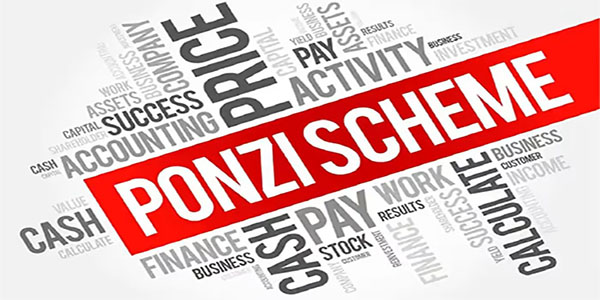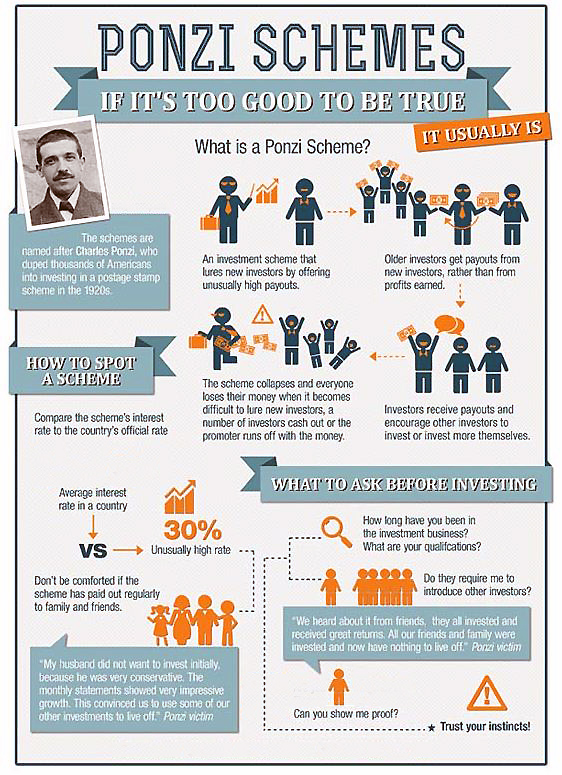
What is a Ponzi Scheme and How to Protect Yourself?
What Is a Ponzi Scam, and How Can You Avoid It?
Ponzi schemes are investment fraud that continues to threaten unsuspecting investors worldwide. Many people fall for the promise of high returns with low risk, only to suffer significant financial losses. In this article, we will explore what Ponzi schemes are and provide tips on protecting yourself from these fraudulent activities.

Understanding Ponzi Schemes
A Ponzi scheme is a type of investment fraud that relies on new investors’ capital to pay returns to earlier investors. The scheme’s promoter or operators promise high returns to investors, often through secret strategies or guaranteed returns, to convince them to invest their money. However, the returns paid to early investors come from the contributions made by new investors rather than from profits or income generated by the investment. This cycle continues as new investors are attracted to the scheme, and the operator uses their contributions to pay off earlier investors. Eventually, the scheme collapses when it becomes impossible to attract new investors, and there is not enough money to pay the promised returns.
Famous Ponzi Schemes
Almost everyone knows about Bernie Madoff, but how many have heard of the Villalobos brothers? For about 20 years, Enrique and Oswaldo Villalobos were legendary in Costa Rica, paying clients up to 3,5% interest in cash per month. Called “The Brothers Fund,” they defrauded 6,400 American and Canadian investors out of around half a billion dollars, making it one of the biggest Ponzi schemes in Central America.
The Scheme
The scheme itself is simple. It pulls in those who believe it will work, only to find their money is gone too late. It is a two-step process that starts with offering an attractive investment opportunity with a return that is too good to believe, yet many will still invest in these schemes. The second part is that there is no investing, only taking money from those new to the system and giving their investment funds to the original investors to keep them on board. Eventually, it will all collapse because insufficient money can continuously be raised to pay off the investors. Madoff’s Ponzi scheme might have lasted to this day had the financial crisis of 2007 not arisen to deplete his ability to pay off the original investors. Despite all the attention drawn to such schemes, they are still being used today.
Protecting Yourself from Ponzi Schemes
The best way to protect yourself from Ponzi schemes is to be aware of their characteristics and follow these tips:
- Research the investment opportunity: Conduct thorough research on the company or individuals offering the investment opportunity. Check for any red flags, such as unlicensed brokers or firms. Research the company’s financials, business model, and reputation before investing.
- Be wary of high returns with minimal risk: Ponzi schemes often promise high returns with minimal risk. However, legitimate investments carry risks and do not guarantee profits. It probably is if an investment opportunity offers returns too good to be true.
- Avoid pressure tactics: Scammers often use high-pressure tactics to get you to invest quickly. Take your time and evaluate the investment opportunity carefully. Do not let anyone pressure you into investing money you cannot afford to lose.
- Demand transparency: Legitimate investments provide transparent information about operations, financials, and investment strategies. Be wary of assets that lack clarity or provide unclear explanations about their investment strategies.
- Consult a professional: Consult a financial advisor or legal professional before investing money. They can provide insights and advice to help you avoid Ponzi schemes and other fraudulent activities.
Final Thoughts
Ponzi schemes can cause significant financial harm to investors. By understanding how Ponzi schemes operate and following the tips outlined above, you can protect yourself from these fraudulent activities. Remember, if an investment opportunity seems too good to be true, it probably is. Stay vigilant, and do not let anyone pressure you into investing your hard-earned money without doing your research and due diligence.
-Written by Glenn Tellier (Founder of Grupo Gap)
Fill in your information to get on our VIP investors list!
Frequently Asked Questions
What is the origin of the term “Ponzi scheme”?
The term “Ponzi scheme” is named after Charles Ponzi, a con man who, in the 1920s, created several pyramid schemes that managed to pull over $20 million from his victims.
How does a Ponzi scheme work?
A Ponzi scheme is a fraudulent investment operation that pays the returns to investors from their own money or the money paid by new investors instead of money earned by the organization running the scheme. The scheme pulls in those who believe it will work, only to find their money is gone too late.
Why do people fall for Ponzi schemes?
People fall for Ponzi schemes because promising high returns with little risk attracts them. The returns offered by the scheme seem too good to be accurate, but people still invest in these schemes.
How can I avoid falling victim to a Ponzi scheme?
To avoid falling victim to a Ponzi scheme, it’s essential to do your due diligence and research any investment opportunity thoroughly. Be wary of any investment opportunity promising high returns with little risk.
What should I do if I suspect I am involved in a Ponzi scheme?
If you suspect you are involved in a Ponzi scheme, it’s essential to contact the appropriate authorities and report the scheme. You may also want to consult an attorney to explore your legal options.
What are the warning signs of a Ponzi scheme?
The warning signs of a Ponzi scheme include high returns with little to no risk, a lack of transparency about the investment, and pressure to invest quickly before the opportunity is gone.
How do Ponzi schemes differ from pyramid schemes?
Ponzi schemes and pyramid schemes are investment scams, but they operate differently. While Ponzi schemes use new investors’ money to pay returns to earlier investors, pyramid schemes rely on new investors to recruit more investors to generate returns for earlier investors.
What are the consequences for those who run Ponzi schemes?
Those who run Ponzi schemes can face serious legal consequences, including criminal charges and civil lawsuits. In addition, they may be required to pay restitution to the victims of their scheme.
Do you want to start investing in Costa Rica?
Looking for Real Estate? – Click HERE.
Need Immigration help in Costa Rica? – Click HERE.
Need a Costa Rican home equity loan? – Click HERE.
Article by Glenn Tellier (Founder of CRIE and Grupo Gap)


Comments (0)